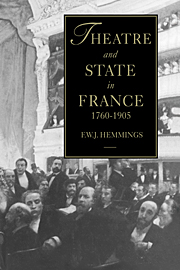Book contents
- Frontmatter
- Contents
- Chronology
- Introduction
- 1 The royal theatres of the ancien régime
- 2 The rise of the commercial theatre
- 3 Dramatic censorship down to its abolition
- 4 The liberation of the theatres
- 5 The royal theatres under the Revolution
- 6 The theatre in the service of the Republic
- 7 Re-establishment of the state theatres
- 8 Curbs on the commercial sector
- 9 Politics and the pit
- 10 The theatre in the provinces
- 11 The licensing system, 1814–1864
- 12 The state-supported theatres in the nineteenth century
- 13 The theatre in crisis: competition from the café-concert
- 14 Dramatic censorship in the nineteenth century
- 15 The private sector
- Notes
- Bibliography
- Guide to further reading
- Index
12 - The state-supported theatres in the nineteenth century
Published online by Cambridge University Press: 31 October 2009
- Frontmatter
- Contents
- Chronology
- Introduction
- 1 The royal theatres of the ancien régime
- 2 The rise of the commercial theatre
- 3 Dramatic censorship down to its abolition
- 4 The liberation of the theatres
- 5 The royal theatres under the Revolution
- 6 The theatre in the service of the Republic
- 7 Re-establishment of the state theatres
- 8 Curbs on the commercial sector
- 9 Politics and the pit
- 10 The theatre in the provinces
- 11 The licensing system, 1814–1864
- 12 The state-supported theatres in the nineteenth century
- 13 The theatre in crisis: competition from the café-concert
- 14 Dramatic censorship in the nineteenth century
- 15 The private sector
- Notes
- Bibliography
- Guide to further reading
- Index
Summary
It was part of the mythology of the royalists under the Restoration that the hereditary monarchy had undergone no interruption – merely a temporary eclipse – during the unfortunate events of the Revolution, the Consulate and the Empire. Louis XVI had suffered a martyr's death in 1793; his rightful heir, the Dauphin, known to his loyal subjects as Louis XVII, had survived him for only two years and died in prison. The crown had then descended to Louis XVI's elder brother, the Comte de Provence, who re-entered Paris on 3 May 1814, hailed as Louis XVIII. In accordance with the fiction that his reign had begun when his brother was executed, and that he had been travelling abroad for his pleasure over the past couple of decades, he dated his first decree on the royal theatres (14 December 1816) from the 22nd year of his reign. This decree purported to reinstate the creaking machinery under which they had been governed during the ancien régime. The Comédie-Française and the Opéra-Comique (formerly the Comédie-Italienne) were once more placed under the supervision of the Gentlemen of the Bedchamber, represented on committees by the Intendant-Général de l'Argenterie et Menus Plaisirs, none other than Papillon de la Ferté. It was not, however, the same person as had played so important a part in the administration of the theatres before the Revolution (he had been guillotined in 1794), but his son, who claimed the office was hereditary; unfortunately he had not inherited his father's talents and before long was the laughing-stock of the actors and actresses nominally under his control.
- Type
- Chapter
- Information
- Theatre and State in France, 1760-1905 , pp. 176 - 192Publisher: Cambridge University PressPrint publication year: 1994



